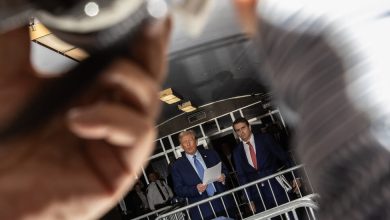Trump’s Act Was Getting Stale. Being a Courtroom Victim Is Just What He Needed.

For the next several weeks, the presumptive Republican nominee for president will be spending his days in a New York City courthouse. By any normal campaign standard, taking your candidate off the road for much of April and May of a presidential year would be devastating. But “normal” and Donald Trump live in different countries. The trial will afford Mr. Trump the opportunity to define the essence of his candidacy: I am a victim.
The very competent operatives running the Trump campaign didn’t draw this up as their ideal campaign plan, but they will appreciate its potential. The Manhattan courtroom will be the setting for Mr. Trump to play the role of a familiar American archetype: the wronged man seeking justice from corrupt, powerful forces. The former president is good in this role, and that’s no small thing.
Presidential campaigns pay a great deal of attention to scheduling — where, when and how many events should a candidate do on any given day. But here’s the most important element of scheduling: putting a candidate in a setting that gives them a chance to excel. In George W. Bush’s 2000 presidential campaign, our default event was to put him at a school, preferably one not in a wealthy ZIP code. Education was his signature issue as governor of Texas. He knew a lot about it, cared about it passionately, and the odds were it would be a successful event. It was not surprising to me that when planes struck the twin towers, President Bush was in an elementary school reading to students.
Mr. Trump loves big rallies. He feeds off the crowd like a vampire at a blood bank. But his act is getting a little old. Cable news no longer cuts live to these invariably repetitive events, and they don’t seem to drive as much conversation among voters as they once did. By contrast, the trial gives Mr. Trump the benefits of renewed interest from voters and the media with no burden on his team to increase campaigning or produce a newsworthy event.
I feel like I have spent half my life in campaign headquarters, staring at a map and a calendar. The map is always too large, and the calendar too short. Time is the one resource allocated to campaigns in exactly the same amounts. But there’s a dirty little secret to presidential campaigns: Where you campaign may be of little consequence. A courthouse could be as valuable as the swingiest swing district in the swingiest swing state.
When Joe Biden received more votes than any presidential candidate in history while largely campaigning from his basement, the MAGA world saw it as proof the campaign was stolen. But I wasn’t surprised. Struck by how much time and energy was spent in racing to campaign events, I asked a basic question in the 2012 Mitt Romney campaign: Does it matter where he goes? We started polling in markets a few days before and after an event, and the results were consistent. There was a three-to-four-point bump immediately after a big rally but it quickly evaporated. A week after the event, the market had reset to where it was before.




